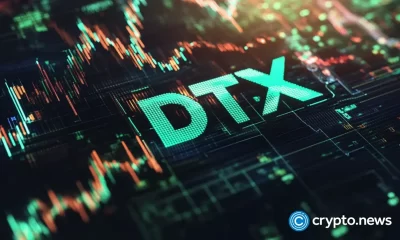Banking
Ripple CTO Calls on US Government To End All Indirect Regulation Including Alleged Debanking of Tech Founders
Published
2 days agoon
By
admin
The chief technology officer of Ripple Labs says that the government needs to address the alleged unconstitutional unbanking of many crypto and tech founders.
In a new thread on the social media platform X, Ripple CTO David Schwartz accuses the government of pressuring banks to cancel unfavored individuals and businesses with no evidence that they committed crimes.
According to Schwartz, this type of “indirect regulation” is unconstitutional as it ignores due process and the First Amendment.
Schwartz refers to the trend as “Orwellian nonsense” and calls for an end to it in its entirety.
“Our government has become addicted to indirect regulation precisely because of these evils. It is cheaper and easier to pressure someone else to punish me than to charge me with a crime and give me due process. But the government ought not to punish people without giving them due process.
It is easier to pressure banks to cut off disfavored businesses than to make that business illegal. But if the government wants to stop some commercial activity, it should go through the proper lawmaking process, with full political accountability, to prohibit it, not use backdoor secret pressure to drive it underground.
END ALL INDIRECT REGULATION.”
Last week, Coinbase chief executive Brian Armstrong said that Senator Elizabeth Warren, a Democrat from Massachusetts, and U.S. Securities and Exchange Commission (SEC) Chair Gary Gensler wanted to destroy the crypto industry and possibly broke the law in their crusade against digital assets.
“Warren and Gensler tried to unlawfully kill our entire industry, and it was a major factor in the Democrats losing the election. The Democratic party should realize Warren is a liability and further distance themselves if they want to have any hope of rebuilding.”
Armstrong made the statement amid swirling rumors that the US government cut off 30 tech and crypto founders from banking services.
Don’t Miss a Beat – Subscribe to get email alerts delivered directly to your inbox
Check Price Action
Follow us on X, Facebook and Telegram
Surf The Daily Hodl Mix
 

Disclaimer: Opinions expressed at The Daily Hodl are not investment advice. Investors should do their due diligence before making any high-risk investments in Bitcoin, cryptocurrency or digital assets. Please be advised that your transfers and trades are at your own risk, and any losses you may incur are your responsibility. The Daily Hodl does not recommend the buying or selling of any cryptocurrencies or digital assets, nor is The Daily Hodl an investment advisor. Please note that The Daily Hodl participates in affiliate marketing.
Generated Image: DALLE3
Source link
You may like


XRP, Stellar investors eye new DeFi token poised for 25x growth by new year


This Altseason Won’t Be What You Expected, According to CryptoQuant CEO – Here’s Why


Cardano Price Prediction as Trump’s New SEC Pick Could Be ADA Supporter


Heat Your Home While Earning Bitcoin With Heatbit


AMP price is rising as top crypto expert sees more upside


Monero Surges to Two-Year High of $211 as Privacy Coins Heat Up
Banking
Hong Kong’s ZA Bank begins sandbox pilot of crypto trading service
Published
1 month agoon
October 29, 2024By
admin

ZA Bank, Hong Kong’s digital bank, has launched a sandbox trial of its crypto trading service, aiming to provide retail investors with a regulated platform for virtual asset trading.
Hong Kong-based virtual bank ZA Bank has launched a sandbox trial for its new virtual asset trading service for select retail customers.
In a press release on Tuesday, Oct. 29, ZA Bank said that its trial initiative seeks to meet growing demand in Hong Kong, where a recent survey by the Hong Kong Investment Funds Association revealed that 75% of retail investors are interested in trading crypto.
Upon completion of the pilot, ZA Bank plans to prepare for a full launch through its banking app, offering retail users more direct access to the global crypto market, which currently exceeds a market capitalization of $2 trillion.
“The wave of favorable policies and good news from the Hong Kong government and the industry during the FinTech Week will inject new momentum into the local fintech ecosystem.”
Ronald Iu, ZA Bank chief executive officer
Although no timeline was provided for the crypto trading service launch, the bank appears to be positioning itself to capitalize on Hong Kong’s new regulatory framework for crypto, hoping to attract users interested in virtual assets in a bank-regulated setting.
In late September, the bank received approval from the China Securities Regulatory Commission to allow the company to add new conditions for virtual asset transactions to its Type 1 license, becoming the first Hong Kong digital-only bank to gain a license from the Securities and Futures Commission for Type 1 regulated activity.
Hong Kong introduced new regulations in 2022, requiring all crypto exchanges operating in the city to submit license applications by February 2024. Since then, over 24 companies struggled to get licenses. By Aug. 2024, around 12 applications have been withdrawn, including those from Bybit, Huobi HK, and OKX.
Source link
Banking
Neobanks are bridging financial gaps with blockchain
Published
1 month agoon
October 27, 2024By
admin
Disclosure: The views and opinions expressed here belong solely to the author and do not represent the views and opinions of crypto.news’ editorial.
Traditional finance has been failing for a long time, but its cracks have always been ignored. Under the current economic challenges, these cracks are finally showing up, and the shortcomings of the traditional financial system can no longer be overlooked. Nearly 1.4 billion people today remain unbanked. Around one-fourth of the global population is left behind by an industry that thrives on exclusion and inefficiency.
With their outdated models, traditional financial institutions continue to exclude those who lack access to documentation, credit histories, or stable infrastructure. This model works against a certain class of population, and there have been no notable changes over the years to increase inclusion. However, blockchain and the new generation of neobanks might have the answer to financial inclusivity in this new age of digital finance.
High fees and delayed transactions
Even beyond inclusivity, traditional financial systems have outdated processes that are proving unmanageable in today’s fast-paced digital era. Consider international money transfers—banks still require days to finalize cross-border transactions, and they add hefty fees to them as well. Remittance charges can soar up to an average of 6.35%, which is significant when you consider the value of currencies in developing nations.
Neobanks built on blockchain infrastructure are changing this. Such platforms eliminate the need for middlemen, so transfers are faster, seamless, low-cost, and almost real-time. The use of decentralized networks removes the friction imposed by traditional banks, creating a financial system that serves everyone—not just the privileged few.
Financial inclusion is more than access
The issue of financial inclusion is not new—it’s been a buzzword in the industry for years. Banks have been constantly scrutinized for overcomplicating onboarding processes and making key financial services inaccessible to socially struggling individuals. The majority of the unbanked population in the world lives in developing regions where financial institutions either don’t operate or have imposed insurmountable barriers to entry. The focus on documentation and credit history has shut out large populations, creating an unequal and unjust global financial system.
Neobanks are challenging this by moving beyond paper-based identification and adopting decentralized models. Technologies like behavior-based identification models through the blockchain—which we are also leveraging at WeFi—can make banking accessible to those who would otherwise be locked out. These next-gen systems can help provide financial identities to users who have been left behind by traditional banks and give them access to equal financial opportunities.
The illusion of ownership in traditional finance
When you deposit your funds to a bank, the general expectation is that it’s safe. You expect your funds to just sit in your account—untouched and free from financial issues. This is an illusion created by traditional financial institutes. Banks have complete access to your funds, and they will use them for lending, investment, and other purposes. Most banks operate under fractional reserve banking models, a highly vulnerable system. In case of too many withdrawal requests in a short period, these banks are prone to collapse. We’ve seen several cases like this during the Covid-19 pandemic. So, the perception that you have full control over the funds in your bank account is a mere illusion.
Neobanks are a great solution to this issue, especially platforms that offer non-custodial accounts. Users can retain full ownership and control over their assets, and the bank or any third party will not have any rehypothecation over them. This kind of autonomy is critical for financial resilience, especially in times of economic uncertainty.
The data exploitation problem
Another major shortcoming of traditional finance is its approach to data. Centralized systems accumulate vast amounts of personal information from customers, creating honeypots for cybercriminals. The finance industry is a prime target for data breaches, with the sector accounting for 27% of all data breaches in 2023 alone. These centralized systems make individuals vulnerable to identity theft, fraud, and other forms of cybercrime, with little accountability on the part of financial institutions.
Blockchain-based neobanks remove this vulnerability by decentralizing data. In this model, individuals retain control over their personal information, and data breaches become less likely due to the transparent and secure nature of the blockchain.
What about volatility?
Whenever a user hears about neobanks or blockchains, the first thought that pops up is ‘crypto is volatile’—its wild price fluctuations are a major worry for the mass population.
Stablecoins provide a solution, offering the stability of traditional currencies while maintaining the speed, transparency, and security of blockchain technology. They create a way for users to avoid the risks associated with volatile assets, ensuring that their financial transactions remain stable and predictable.
The future of finance will inevitably revolve around stablecoins, as they offer a clear path to financial inclusion without exposing users to the high-risk nature of the broader cryptocurrency market. These digital assets make financial services accessible, transparent, and reliable for anyone, anywhere.
TradFi is failing the world, and decentralization is the solution
The cracks in traditional finance are deepening. For too long, banks have held control over money and dictated who can participate in the financial system. It resulted in billions of people being left behind, either because they lack documentation, live in remote areas, or simply cannot afford the fees. This system is broken beyond repair, and it’s time for something new.
Blockchain-fueled neobanks are the optimal solution to dismantling the barriers that have excluded many from basic financial opportunities. By offering a decentralized, inclusive, and transparent alternative, these platforms represent the future of finance, one where everyone, regardless of location or financial background, can participate.

Maksym Sakharov
Maksym Sakharov is the group CEO, co-founder, and board member of WeFi, an on-chain, non-custodial neobank. With over eight years of management experience in the IT industry, Maksym brings a diverse skill set encompassing strong leadership, operational excellence, and service delivery. He has served as the CEO and co-founder of Exflow, as well as the founder and CEO of Whitemark. His career spans various environments, from start-ups to established IT development firms, where he has successfully managed operational performance across the Asia Pacific region. His strategic approach to management focuses on optimizing processes and driving team performance, enabling organizations to thrive in competitive markets. Through his extensive experience, Maksym has developed a reputation for fostering collaboration and innovation, making him a valuable asset in any operational setting.
Source link
Amazon
Boerse Stuttgart’s crypto provider taps Amazon to expand crypto offerings for institutions
Published
2 months agoon
October 14, 2024By
admin

Boerse Stuttgart Digital has partnered with Amazon Web Services to enhance its crypto infrastructure, enabling European financial institutions to scale their offerings.
Boerse Stuttgart Digital, a German crypto infrastructure hub powered by Boerse Stuttgart Group, has entered into a partnership with Amazon Web Services to enhance its offerings for European financial institutions as the demand for crypto services continues to rise.
In a Monday press release, Oct. 14, the Stuttgart-headquartered company said the collaboration aims to improve the scalability of its solutions, designed for traditional banks, brokers, and asset managers. The company says the collaboration was born in response to a new trend as retail customers and corporates across Europe are “increasingly seeking reliable avenues to venture into the crypto market.”
“Traditional financial institutions are facing a pivotal choice: to miss out on this structural trend or partner with established infrastructure providers which stand for trust, security, and reliability.”
Boerse Stuttgart Digital
Addressing the partnership, Boerse Stuttgart Group’s CEO Matthias Voelkel said that institutional investors are “eager to offer their clients access to cryptocurrencies and digital assets without compromising on trust, security and reliability.”
The development comes as Boerse Stuttgart Digital expands its client roster, particularly with DZ Bank, a key player in the German cooperative banking sector and one of the largest banking groups in Europe. In mid-September, Boerse Stuttgart Digital said that DZ Bank would empower 700 cooperative banks to offer their retail customers the ability to trade cryptocurrencies and store them in licensed fiduciary custody.
Source link

XRP, Stellar investors eye new DeFi token poised for 25x growth by new year

This Altseason Won’t Be What You Expected, According to CryptoQuant CEO – Here’s Why

Cardano Price Prediction as Trump’s New SEC Pick Could Be ADA Supporter

Heat Your Home While Earning Bitcoin With Heatbit

AMP price is rising as top crypto expert sees more upside

Monero Surges to Two-Year High of $211 as Privacy Coins Heat Up

Red Alert For Pi Network Price As A Risky Pattern Forms

AMP surged 60% amid increased whale interest

Top Analyst Confirms Altcoin Season, What’s Next for XRP, SOL, HBAR, and SHIB?

DCG Confirms Reports Foundry Layoffs, Says its 16% of U.S. Employees

Arbitrum One as the first layer-2 to reached $20 bilion in TVL

Pepe Coin Whales Continue To Accumulate Signaling 7x Gains For PEPE Looms

Solana (SOL) Back on Track: Is The Uptrend Here to Stay?

Celcius founder plead guilty due to fraud charges

BNB Price Skyrockets To New All Time High, Rally To $1000 Near?
182267361726451435

Why Did Trump Change His Mind on Bitcoin?

Top Crypto News Headlines of The Week

New U.S. president must bring clarity to crypto regulation, analyst says

Bitcoin Open-Source Development Takes The Stage In Nashville

Will XRP Price Defend $0.5 Support If SEC Decides to Appeal?

Ethereum, Solana touch key levels as Bitcoin spikes

Bitcoin 20% Surge In 3 Weeks Teases Record-Breaking Potential

Ethereum Crash A Buying Opportunity? This Whale Thinks So

Shiba Inu Price Slips 4% as 3500% Burn Rate Surge Fails to Halt Correction

‘Hamster Kombat’ Airdrop Delayed as Pre-Market Trading for Telegram Game Expands

Washington financial watchdog warns of scam involving fake crypto ‘professors’

Citigroup Executive Steps Down To Explore Crypto
Mostbet Güvenilir Mi – Casino Bonus 2024

Bitcoin flashes indicator that often precedes higher prices: CryptoQuant
Trending

 3 months ago
3 months ago182267361726451435

 Donald Trump4 months ago
Donald Trump4 months agoWhy Did Trump Change His Mind on Bitcoin?

 24/7 Cryptocurrency News4 months ago
24/7 Cryptocurrency News4 months agoTop Crypto News Headlines of The Week

 News3 months ago
News3 months agoNew U.S. president must bring clarity to crypto regulation, analyst says

 Opinion5 months ago
Opinion5 months agoBitcoin Open-Source Development Takes The Stage In Nashville

 Price analysis4 months ago
Price analysis4 months agoWill XRP Price Defend $0.5 Support If SEC Decides to Appeal?

 Bitcoin5 months ago
Bitcoin5 months agoEthereum, Solana touch key levels as Bitcoin spikes

 Bitcoin4 months ago
Bitcoin4 months agoBitcoin 20% Surge In 3 Weeks Teases Record-Breaking Potential


